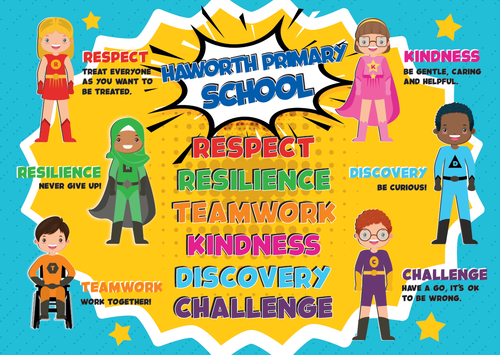Online Safety - Advice for Parents
At Haworth Primary School, we take the safeguarding of our children extremely seriously. In school, we know that children's use of the online world, often through the use of a mobile phone, gives them fantastic access to a world of learning. We want to encourage children to use the internet - providing it's done safely. Our online safety curriculum in school aims to equip children with the skills to do precisely that. However, safeguarding children as they learn, play and explore online is a responsibility for adults in school and those at home too. Should you have a concern about your child's use of the internet, please contact your child's class teacher in the first instance. In school, our practice is informed by CEOP, which is part of the National Crime Agency. ThinkUKnow is part of CEOP's education programme. You can find more information via the link below.
https://www.thinkuknow.co.uk/parents/
Ask your child to show you sites they use.
By doing so, your child is including you in their online life and social activity. Show an interest and take note of the names of their favourite sites. You can then re-visit these when you are alone. Take your time and explore the space, find out how to set the safety features and learn how to report any issues directly to the site.
Ask your child to set their profile settings to private.
Social networking sites are used by children to share information, photos and just about everything they do! Encourage your child to set their privacy settings to private. They need to think about the information they post online as it could be copied and pasted anywhere, without their permission. If it got into the wrong hands, somebody may wish to use it against them or worst of all try to locate them in the real world.
Speak to your child about their online friends.
We know that people lie online about who they are and may create fake identities. It is very important children understand this. Whether they are visiting a social network or a gaming site, the safety messages are the same. Children and young people must never give out personal information and only be “friends” with people they know and trust in the real world.
Set appropriate parental controls on my child’s computer, mobile and games console.
Filters on computers and mobiles can prevent your child from viewing inappropriate and possibly illegal content. You can activate and change levels depending on your child’s age and abilities. You can also set time restrictions for using the internet or games. They can be free and easy to install. Call your service provider who will be happy to assist or visit CEOP’s parents' site for further information. Explain to your child why you are setting parental controls when you talk to them about their internet use.
Speak to your child about their use of the online world.
Sometimes children get into situations online where they don’t feel comfortable or see something they don’t want to see. By opening up the communication channels and talking to your child about the internet, their favourite sites and the risks they may encounter, they are more likely to turn to you if they are concerned about something.
Know where to get help if you have concerns.
The CEOP Safety Centre provides access to a range of services. If you are concerned that an adult has made inappropriate contact with your child you can report this directly to CEOP.
Below, we have included guides to some of the sites and apps that we know that children are using. Should you have concerns about specific games or apps, please speak to your child about your concerns and then, of course, liaise with your child's class teacher where appropriate.






